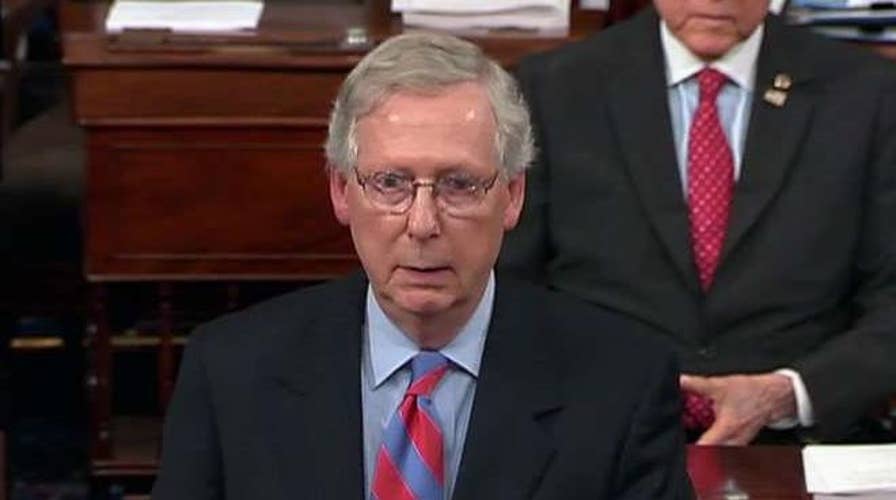Sen. McConnell: Clearly a disappointing moment
Senate majority leader addresses Senate as 'skinny repeal' of ObamaCare fails after Republican Sens. McCain, Murkowski and Collins vote no
A gentle, almost Irish mist cloaked most of Washington, DC early Saturday morning. Cloudbursts, thunderstorms and flooding washed out Friday. Basements and alleys flooded. Sump pumps labored overtime. Compared to the sodden circumstances the day before, Saturday morning’s drizzle was a welcome sight as people headed to yoga classes and out on coffee runs.
But in the empire of Twitter, President Trump pierced the morning brume with a torrent of tweets. The president railed about health care, parliamentary procedure and the Senate.
“Republican Senate must get rid of 60 vote NOW! It is killing the R party, allows 8 Dems to control country. 200 Bills sit in Senate A JOKE!” the chief executive tweeted.
What Trump alluded to is the 60-vote threshold used to break legislative filibusters in the Senate.
Senate Republicans hold 52 seats. Senate Majority Leader Mitch McConnell, R-Ky., knew Democrats would filibuster any attempt to repeal and replace ObamaCare. So McConnell deployed a special parliamentary process for health care that eliminates filibusters. It’s called “budget reconciliation.”
The gambit allows Republicans to lower the bar to just 51 yeas. But for all the GOP’s sturm and drang about repealing and replacing the 2010 health care law, McConnell couldn’t even cobble together 51 votes -- let alone 50 yeas -- to let Vice President Pence break the tie.
So, it wasn’t the higher threshold that doomed Trump’s health care effort. Senate Republicans were at fault, even though they used the budget reconciliation process to avoid a 60-vote hoop.
The president tweeted a few moments later.
“The very outdated filibuster rule must go. Budget reconciliation is killing R’s in the Senate. Mitch M, go to 51 Votes NOW and WIN. IT’S TIME!”
But it’s budget reconciliation that eliminates filibusters. McConnell elected to bypass Senate convention and aim for just 51 ayes rather than 60. The president’s argument didn’t compute.
A third tweet ricocheted around Washington four minutes later: “Republicans in the Senate will NEVER win if they don’t go to a 51 vote majority NOW. They look like fools and are just wasting time…..”
Yet Republicans tried to advance health care with just the 51 vote majority and it blew up on them.
The president wasn’t done.
“If the Senate Democrats ever got the chance, they would switch to a 51 majority vote in first minute. They are laughing at R’s. MAKE CHANGE!” Trump charged in another tweet.
Democrats controlled the Senate from January 3, 2007, through January 2, 2015. They never moved to a 51-vote majority to advance legislation in eight years.
Yes, Democrats altered the Senate standard on filibusters for most executive branch nominees, but not legislation. And never mind what then-civilian President Trump tweeted in 2013 after Senate Democrats initiated the “nuclear option” to help confirm some of then-President Barack Obama’s nominees.
“Thomas Jefferson wrote the Senate filibuster rule. Harry Reid and Obama killed it yesterday. Rule was in effect for over 200 years,” Trump tweeted nearly four years ago.
So, where does this leave the Senate?
Senate Republicans struggled with 60 votes. They dropped the bar for health care to 51 yeas under budget reconciliation. They intend to use the same budget reconciliation maneuver for tax reform. Some ask (facetiously) if they could lower the requirement to pass bills even still.
Trump's tweets represent a profound disconnect with what Senate Republicans did and may try to do. That’s to say nothing of what Trump charges Senate Democrats would do if they regained the majority.
The Senate operates under “standing rules” and “precedent.” Standing Senate Rule XXII governs filibusters. Changing the rules requires 60 votes. But that’s a bit of a distraction. A supermajority of 67 yeas are needed to overcome a filibuster on a rules change. Therefore, the operative number is two-thirds.
If you can’t get 51 votes for something, you certainly can’t garner 60 votes for something. And that means you’re not going to come within a light year of 67 yeas.
This is why Senate Democrats elected to alter the body’s “precedent” in 2013 when it came to nominations, rather than initiate a fool’s errand to switch the rules.
They touched off what we’ll call Nuclear Option I in November 2013 to overcome GOP filibusters of Obama’s nominees. With a simple majority (51), Democrats established a new precedent to drop the number to overcome filibusters on most executive branch nominees from 60. However, Democrats maintained the 60-vote stipulation for Supreme Court nominees.
Republicans returned the favor in April with what we’ll call Nuclear Option II. Using precisely the same parliamentary tactics, Senate Republicans created a new precedent to wipe out filibusters of Supreme Court nominees.
The new precedent made 51 votes the prerequisite to end filibusters of nominees for the High Court, rather than the old 60. Had Senate Republicans not introduced a new precedent, they never would have muscled conservative Judge Neil Gorsuch onto the Supreme Court.
What Trump addresses in his tweets is either a rules change or a precedent change for legislation.
As discussed, a rules change is a non-starter. However, a precedent change could be in play, ala a hypothetical Nuclear Option III.
McConnell has said repeatedly there isn’t enough of an appetite on either side of the aisle to alter the filibuster provisions for legislation.
Even so, Nuclear Option III would require 51 votes to alter the precedent. The Senate hasn’t done a very good job showing there’s 51 votes for anything of late. And despite the President’s tweets, eliminating the filibuster isn’t going to help them pass health care reform.
Some argue it’s “unconstitutional” for the Senate to have all sorts of arcane provisions that fly in the face of “majority rule.”
However, Article I, Section 5 of the Constitution states the following: “Each House may determine the Rules of its Proceedings.”
That means the Senate gets to decide how it operates. Want to change that? Then amend the Constitution. That entails a two-thirds vote of both bodies of Congress and the blessing of 38 states.
Good luck.
McConnell and many senators from both parties take the long view. Let’s say Republicans do establish a new precedent for garden variety bills.
This may be good for the GOP since it now control the Senate. But what about the inevitable day when Democrats again earn control of the chamber? Democrats could very well exploit the new provision to approve a single-payer health care system and their version of immigration reform.
Be careful what you wish for.
Trump may be applying pressure on McConnell to take action. This comes as the majority leader -- often viewed as a parliamentary master -- craters at his lowest ebb.
Multiple Republican senators confided privately to Fox that that were disappointed in the way the Kentucky Republican handled the health care bill.
McConnell kept the original two versions of health care close to the vest. He didn’t pop the key amendment on the so-called “skinny repeal” until 10 p.m. on Thursday.
Senators had little information about the schedule. Then there’s the lack of success with this strategy. One prominent GOP senator told Fox that McConnell seemed unaware of the credibility he lost among fellow Republicans.
In late 2002, the administration of President George W. Bush wanted to torpedo then Senate Majority Leader Trent Lott. The Mississippi Republican uttered controversial remarks about segregation and race at the 100th birthday party of the late Sen. Strom Thurmond, R-S.C.
The brouhaha simmered for weeks. Under intense pressure, Lott stepped down from his post by Christmas, making way for Senate Majority Leader Bill Frist, R-Tenn.
This is not to say that the Trump administration has it in for McConnell.
But the president is demanding Senate action on health care and changing the rules/precedents. Some members of the president’s administration are suggesting the Senate shouldn’t act on anything else until it finishes health care.
McConnell has said there isn’t enough support in the Senate to change the filibuster rule. At 1:46 a.m. Friday after the failed vote, McConnell declared “It is time to move on.”
There will surely be recriminations in the coming days. The president is disappointed. Tensions remain high. And health care is not completely dead. Just a vote or two away. But one thing is clear: Approving a health care bill in the Senate would certainly be a lot easier than changing the Senate’s rules.












































